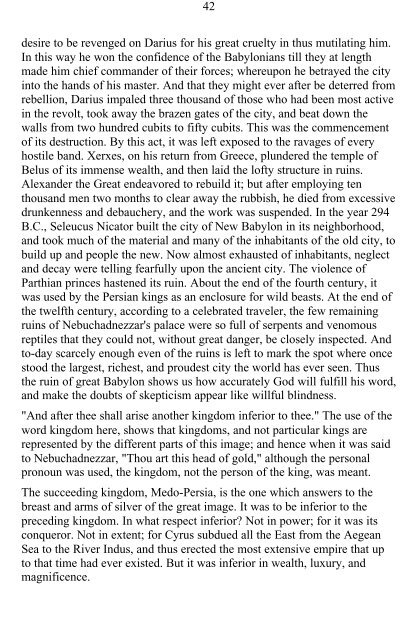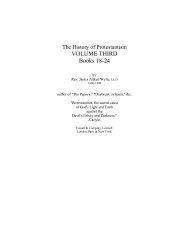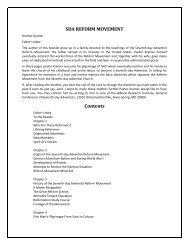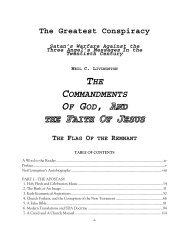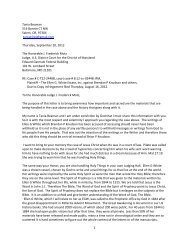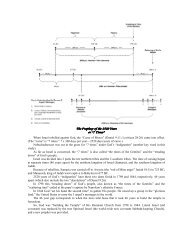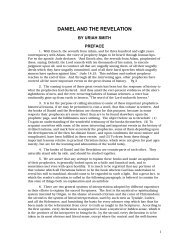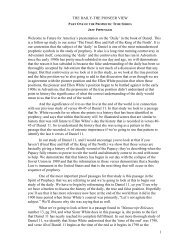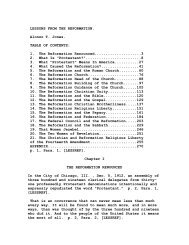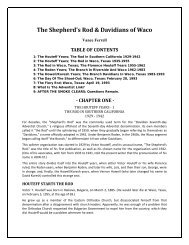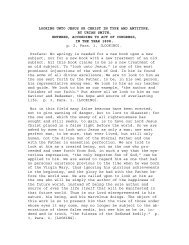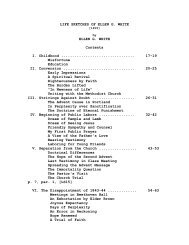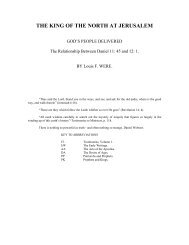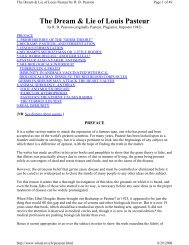- Page 1 and 2: The Lighthouse Digital Library Dani
- Page 3 and 4: iii be the book wherein God has und
- Page 5 and 6: v There seems to be no prophecy whi
- Page 7 and 8: vii CHAPTER IV NEBUCHADNEZZAR'S DEC
- Page 9 and 10: Christian Era Intermediate Dates Ha
- Page 11 and 12: CHAPTER I xi THE BOOK OF REVELATION
- Page 13 and 14: xiii CHAPTER XI THE TWO WITNESSES .
- Page 15 and 16: xv CHAPTER XXI THE NEW JERUSALEM ..
- Page 17 and 18: xvii the most stirring activities,
- Page 19 and 20: 19 Response of History to the Proph
- Page 21 and 22: 21 We have in these verses the reco
- Page 23 and 24: 23 Nebuchadnezzar appears upon this
- Page 25 and 26: nationality, he acknowledged them t
- Page 27 and 28: difficulty lay equally within the p
- Page 29 and 30: 29 must fall, however high its vota
- Page 31 and 32: 31 of his help. Let Daniel's course
- Page 33 and 34: 33 Here is brought out another of t
- Page 35 and 36: 35 wheresoever the children of men
- Page 37 and 38: 37 When we say that the image of Da
- Page 39 and 40: 39 waters of the Euphrates, but the
- Page 41: 41 and understood its fearful impor
- Page 45 and 46: funeral. For this generous act let
- Page 47 and 48: 47 the kingdom represented by that
- Page 49 and 50: 49 set up in the days when Christ w
- Page 51 and 52: 51 cannot refer to the four precedi
- Page 53 and 54: 53 and the toes do not? We answer t
- Page 55 and 56: of men;' i.e., marriages shall be f
- Page 57 and 58: 57 the Roman empire before the king
- Page 59 and 60: 59 we ask, What is meant by their b
- Page 61 and 62: 61 The coming kingdom! This ought t
- Page 63 and 64: 63 THE FIERY ORDEAL "VERSE 1. Nebuc
- Page 65 and 66: 65 requirement they could comply an
- Page 67 and 68: 67 for, first, the king had put the
- Page 69 and 70: 69 NEBUCHADNEZZAR'S DECREE "VERSE 1
- Page 71 and 72: 71 were taken to teach him what not
- Page 73 and 74: 73 he will. 26. And whereas they co
- Page 75 and 76: 75 At the end of seven years, God r
- Page 77 and 78: 77 BELSHAZZAR'S FEAST "VERSE 1. Bel
- Page 79 and 80: 79 found in thee. 15. And now the w
- Page 81 and 82: 81 In this inscription each words s
- Page 83 and 84: 83 Rested his rage and curbed his c
- Page 85 and 86: 85 And not a scabbard hideth sword
- Page 87 and 88: 87 Oh! ever, when the happy laugh i
- Page 89 and 90: 89 Hast thou not read the lesson of
- Page 91 and 92: 91 DANIEL IN THE LIONS' DEN "VERSE
- Page 93 and 94:
93 petition should be asked of the
- Page 95 and 96:
95 respect and honor, "O king, live
- Page 97 and 98:
97 THE FOUR BEASTS "VERSE 1. In the
- Page 99 and 100:
99 eagle upon its prey. The boldnes
- Page 101 and 102:
101 answer. This power was diverse
- Page 103 and 104:
103 were repeated a score of times?
- Page 105 and 106:
105 nations, and languages, that sh
- Page 107 and 108:
107 else will do it. See the specif
- Page 109 and 110:
109 upon the world, occasioning so
- Page 111 and 112:
111 reproach of barbarian was embit
- Page 113 and 114:
113 predecessor of Justinian] does
- Page 115 and 116:
115 Procopius relates that the Afri
- Page 117 and 118:
117 destroyed, by various tortures,
- Page 119 and 120:
119 Pagan Rome persecuted relentles
- Page 121 and 122:
121 under chapter 9:25-27.) Four ye
- Page 123 and 124:
123 prophecy of Isaiah (21:2), Elam
- Page 125 and 126:
125 of Issus in Cilicia, and afterw
- Page 127 and 128:
127 which cannot be misunderstood,
- Page 129 and 130:
129 The little horn comes forth fro
- Page 131 and 132:
131 system are fully met, the proph
- Page 133 and 134:
133 three earthly governments are i
- Page 135 and 136:
135 to the new earth; but even that
- Page 137 and 138:
137 Respecting the earth or the lan
- Page 139 and 140:
139 There is no mistaking the objec
- Page 141 and 142:
141 Where, then, shall we look for
- Page 143 and 144:
143 sanctuary of the first covenant
- Page 145 and 146:
145 The reason Paul assigns why thi
- Page 147 and 148:
147 those priests ministered, so ev
- Page 149 and 150:
149 We now enter upon an interpreta
- Page 151 and 152:
151 them possessed the strength of
- Page 153 and 154:
153 SEVENTY WEEKS "VERSE 1. In the
- Page 155 and 156:
155 To this point Daniel's prayer i
- Page 157 and 158:
157 given in a night vision. Chapte
- Page 159 and 160:
159 beings, the highest in the univ
- Page 161 and 162:
161 "Thus Chaldaic and Rabbinical a
- Page 163 and 164:
163 calls his attention in the prec
- Page 165 and 166:
165 Dating from the first two of th
- Page 167 and 168:
167 the city and the wall; and it i
- Page 169 and 170:
169 Christ, could cease only at the
- Page 171 and 172:
171 ourselves in the autumn of A.D.
- Page 173 and 174:
173 and as all reliable expositors
- Page 175 and 176:
175 And we have seen (and this is w
- Page 177 and 178:
177 but may be applied to the whole
- Page 179 and 180:
179 to which he earnestly desired l
- Page 181 and 182:
181 approaches, and lays his hand u
- Page 183 and 184:
183 up prayer as fervent and effect
- Page 185 and 186:
185 A LITERAL PROPHECY "VERSE 1. As
- Page 187 and 188:
187 north of Palestine; Seleucus ha
- Page 189 and 190:
189 Syria, Cilicia, the upper parts
- Page 191 and 192:
191 of the great name which he migh
- Page 193 and 194:
193 two provinces, with all their c
- Page 195 and 196:
195 fathoming Pompey's real sentime
- Page 197 and 198:
197 following stratagem: Laying her
- Page 199 and 200:
199 when danger was supposed to be
- Page 201 and 202:
201 "Tacitus records the events of
- Page 203 and 204:
203 "VERSE 23. And after the league
- Page 205 and 206:
205 "VERSE 25. And he shall stir up
- Page 207 and 208:
207 This battle doubtless marks the
- Page 209 and 210:
209 Roman soldier seized a brand of
- Page 211 and 212:
211 "Indignation against the covena
- Page 213 and 214:
213 paganism. He reigned to A.D.514
- Page 215 and 216:
215 "Rendering honor to the apostol
- Page 217 and 218:
217 Thus the Gothic horn, the last
- Page 219 and 220:
219 system of religion. The only di
- Page 221 and 222:
221 whatever is venerable, graceful
- Page 223 and 224:
223 they worshiped, the National Co
- Page 225 and 226:
225 clergy, and persons convicted a
- Page 227 and 228:
227 England by intercepting her Eas
- Page 229 and 230:
229 Respecting the application of t
- Page 231 and 232:
231 and Turks, how did this questio
- Page 233 and 234:
233 tabernacles, movable dwellings,
- Page 235 and 236:
235 The words of Bonaparte, quoted
- Page 237 and 238:
237 education. In practice, however
- Page 239 and 240:
239 following conclusions: The voic
- Page 241 and 242:
241 To avoid difficulty here, let t
- Page 243 and 244:
243 for a predicate to be supplied
- Page 245 and 246:
245 they have conscious being. And
- Page 247 and 248:
247 Besides this, they show all the
- Page 249 and 250:
249 Philadelphia in 1876. At the Pa
- Page 251 and 252:
251 facilities and comforts of life
- Page 253 and 254:
253 he had grievously oppressed the
- Page 255 and 256:
255 abomination that maketh desolat
- Page 257 and 258:
257 no further than to the precedin
- Page 259 and 260:
259 RESPONSE OF HISTORY TO THE REVE
- Page 261 and 262:
261 THE OPENING VISION The book of
- Page 263 and 264:
263 called Michael, the very person
- Page 265 and 266:
265 seven literal churches named, d
- Page 267 and 268:
267 The First Begotten of the Dead.
- Page 269 and 270:
269 His Coming Visible. "Every eye
- Page 271 and 272:
271 brother of the universal church
- Page 273 and 274:
273 hold that the expression "the L
- Page 275 and 276:
275 the Lord made heaven and earth,
- Page 277 and 278:
277 this one is the unchanging Frie
- Page 279 and 280:
279 "An opinion has been held by so
- Page 281 and 282:
281 some remaining steadfast, some
- Page 283 and 284:
283 renewed habitation of redeemed
- Page 285 and 286:
285 resurrection of the just, says
- Page 287 and 288:
287 The Cause of Censure. Disadvant
- Page 289 and 290:
289 and faith, and thy patience, an
- Page 291 and 292:
291 truth is not a burden to any ac
- Page 293 and 294:
293 THE SEVEN CHURCHES CONTINUED "V
- Page 295 and 296:
295 therefore, and be converted, th
- Page 297 and 298:
297 for the antitype of the ark of
- Page 299 and 300:
299 are, the name of the New Jerusa
- Page 301 and 302:
301 to represent him as preferring
- Page 303 and 304:
303 possession of a crown of life.
- Page 305 and 306:
305 that they say they are rich, an
- Page 307 and 308:
307 And then the promise! "I will c
- Page 309 and 310:
309 in the foregoing paraphrase are
- Page 311 and 312:
311 it there expressed the state of
- Page 313 and 314:
313 assistants of Christ in his med
- Page 315 and 316:
315 So, even with us here, though r
- Page 317 and 318:
317 and on the backside, as the pun
- Page 319 and 320:
319 the book and to open the seals
- Page 321 and 322:
321 things described; and we gain a
- Page 323 and 324:
323 for man the shedding of his blo
- Page 325 and 326:
325 THE SEVEN SEALS "VERSE 1. And I
- Page 327 and 328:
327 Nicaea, and was most prominent
- Page 329 and 330:
329 superseded by horrid superstiti
- Page 331 and 332:
331 by their brethren being killed
- Page 333 and 334:
333 On such passages as this, the r
- Page 335 and 336:
335 seals be made to be literal, no
- Page 337 and 338:
337 "In this case we must either su
- Page 339 and 340:
339 hearts failing them for fear' t
- Page 341 and 342:
341 And whenever on this memorable
- Page 343 and 344:
343 will shake, but the heavens als
- Page 345 and 346:
345 THE SEALING "VERSE 1. And after
- Page 347 and 348:
347 sure; to set a seal or mark upo
- Page 349 and 350:
349 earth is the being who here dem
- Page 351 and 352:
351 Egyptians (Exodus 12); also of
- Page 353 and 354:
353 was laid upon the surging eleme
- Page 355 and 356:
355 redeemed hosts will go in and o
- Page 357 and 358:
357 different, that he does not rec
- Page 359 and 360:
359 THE SEVEN TRUMPETS We name as t
- Page 361 and 362:
361 thither they could direct their
- Page 363 and 364:
363 Many thousands were inhumanly m
- Page 365 and 366:
365 in the port of Carthage, and Ge
- Page 367 and 368:
367 his appearance, in the language
- Page 369 and 370:
369 royalty disappeared from the im
- Page 371 and 372:
371 continued to assemble as usual.
- Page 373 and 374:
373 THE SEVEN TRUMPETS CONTINUED "V
- Page 375 and 376:
375 "More complete illustration of
- Page 377 and 378:
377 corn. Cut down no fruit-trees,
- Page 379 and 380:
379 them, or left them only to a mo
- Page 381 and 382:
381 uniting in his person the highe
- Page 383 and 384:
383 succeeded in the empire, in 145
- Page 385 and 386:
385 'the double walls were reduced
- Page 387 and 388:
387 It is apparent that just as soo
- Page 389 and 390:
389 THE PROCLAMATION OF THE ADVENT
- Page 391 and 392:
391 troubled, neither by spirit, no
- Page 393 and 394:
393 The Days of the Voice of the Se
- Page 395 and 396:
395 experience of the church is to
- Page 397 and 398:
397 examination of the sanctuary on
- Page 399 and 400:
399 "When they shall have finished
- Page 401 and 402:
401 expression signifies great exal
- Page 403 and 404:
403 establishment of the kingdom of
- Page 405 and 406:
405 testimony, or ten commandments.
- Page 407 and 408:
407 No symbols more fitting and imp
- Page 409 and 410:
409 combined powers of earth and he
- Page 411 and 412:
411 against the woman, the church,
- Page 413 and 414:
413 the "mystery of iniquity" was a
- Page 415 and 416:
415 PERSECUTING POWERS "VERSE 1. An
- Page 417 and 418:
417 people on account of their reli
- Page 419 and 420:
419 6. At the end of that specified
- Page 421 and 422:
421 save he that had the mark, or t
- Page 423 and 424:
423 the conclusions at which we mus
- Page 425 and 426:
425 government, say that it denotes
- Page 427 and 428:
427 Being thus excluded from easter
- Page 429 and 430:
429 for independence. In 1776, they
- Page 431 and 432:
431 people of this government do no
- Page 433 and 434:
433 none, which is the very worst s
- Page 435 and 436:
435 a. The spirits which communicat
- Page 437 and 438:
437 The Papacy was a church clothes
- Page 439 and 440:
439 communicants, representing a ge
- Page 441 and 442:
441 members to be intolerant toward
- Page 443 and 444:
443 The acts ascribed to the image
- Page 445 and 446:
445 against the most High, and shal
- Page 447 and 448:
447 If now the reader will compare
- Page 449 and 450:
449 Ques. Have you any other way of
- Page 451 and 452:
451 The nature of the change which
- Page 453 and 454:
453 wicked governments of the earth
- Page 455 and 456:
455 Christianity has become popular
- Page 457 and 458:
457 "But, independent of the questi
- Page 459 and 460:
459 Washington and spoken. The work
- Page 461 and 462:
461 average politicians, who, when
- Page 463 and 464:
463 1904. A sunday bill for the Dis
- Page 465 and 466:
465 for all the world is to wonder
- Page 467 and 468:
467 This title, there is reason to
- Page 469 and 470:
469 Thus closes chapter 13, leaving
- Page 471 and 472:
471 They are the overcomers in the
- Page 473 and 474:
473 the wrath of God, which is pour
- Page 475 and 476:
475 past; as, first, in the days of
- Page 477 and 478:
477 In verse 13 of Revelation 14, a
- Page 479 and 480:
479 he had just set forth in Matthe
- Page 481 and 482:
481 "Mr Fox, a Scottish missionary
- Page 483 and 484:
483 be no longer, another work of p
- Page 485 and 486:
485 2300 days, when the work of jud
- Page 487 and 488:
487 obscurity: "The seven heads are
- Page 489 and 490:
489 than do worldlings themselves.
- Page 491 and 492:
491 pope's temporal power; on the c
- Page 493 and 494:
493 held by these, as under the stu
- Page 495 and 496:
495 The Christian Palladium of May
- Page 497 and 498:
497 The New York Independent of Dec
- Page 499 and 500:
499 find themselves worshiping the
- Page 501 and 502:
501 1844, and that the proclamation
- Page 503 and 504:
503 "that to whom ye yield yourselv
- Page 505 and 506:
505 In reference to this issue, the
- Page 507 and 508:
507 keeps it. To have to do with su
- Page 509 and 510:
509 irreversible crisis. Ah! how li
- Page 511 and 512:
511 the wicked perishing around the
- Page 513 and 514:
513 the ones to deliver to the mini
- Page 515 and 516:
515 THE PLAGUES POURED OUT This cha
- Page 517 and 518:
517 to inquire into their nature, a
- Page 519 and 520:
519 The Fifth Plague. An important
- Page 521 and 522:
521 power; and being the first and
- Page 523 and 524:
523 But what is the force of the ca
- Page 525 and 526:
525 the fierceness of his wrath. 20
- Page 527 and 528:
527 thrown me to the sky, and the n
- Page 529 and 530:
529 BABYLON THE MOTHER "VERSE 1. An
- Page 531 and 532:
531 certain phases during which thi
- Page 533 and 534:
533 be fulfilled. 18. And the woman
- Page 535 and 536:
535 a position where they will fina
- Page 537 and 538:
537 fundamental dogma in the creeds
- Page 539 and 540:
539 foul, and birds that are hatefu
- Page 541 and 542:
541 presence. Light flashes everywh
- Page 543 and 544:
543 hand, but none to buy them, the
- Page 545 and 546:
545 "VERSE 20. Rejoice over her, th
- Page 547 and 548:
547 (which see), of the worshipers
- Page 549 and 550:
549 simply says that he is the fell
- Page 551 and 552:
551 the burning flame. And this fol
- Page 553 and 554:
553 Charles Beecher, in Redeemer an
- Page 555 and 556:
555 mountains have been moved out o
- Page 557 and 558:
557 Lest any one should say that if
- Page 559 and 560:
559 One among many objections to th
- Page 561 and 562:
561 fervent heat. 2Pet.3:7-13. The
- Page 563 and 564:
563 mind, the sufferings of each ma
- Page 565 and 566:
565 where he now, as priest-king, s
- Page 567 and 568:
567 (Rev.5:13) goes up from a redee
- Page 569 and 570:
569 Here, then, Paul makes an inspi
- Page 571 and 572:
571 view is taken by Jas. Du Pui, A
- Page 573 and 574:
"Beryl is of a sea-green color. 573
- Page 575 and 576:
575 that the Lord bindeth up the br
- Page 577 and 578:
577 and eighty miles. It may be sai
- Page 579 and 580:
579 that is holy, let him be holy s
- Page 581 and 582:
581 as he is the great prototype of
- Page 583 and 584:
583 eternal city; if you would walk
- Page 585 and 586:
585 for the marriage supper. We cry
- Page 587 and 588:
587 But we need offer no apology fo
- Page 589 and 590:
589 baptizes, he need not do it in
- Page 591 and 592:
591 for the same causes are operati
- Page 593 and 594:
593 only during the pleasure of the
- Page 595 and 596:
595 to your sins." More judgments a
- Page 597 and 598:
597 burned in 1415, and his ashes,
- Page 599 and 600:
599 purposes. On the decease of Edw
- Page 601 and 602:
601 Zurich. Here he made a special
- Page 603 and 604:
603 to introduce open-air services.
- Page 605 and 606:
605 intrigue and influence, July 21
- Page 607 and 608:
607 Clarke, Barnes, Elliott, Cottag


